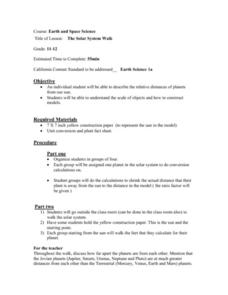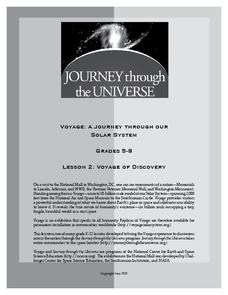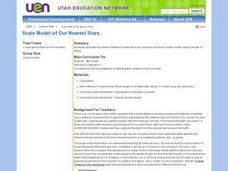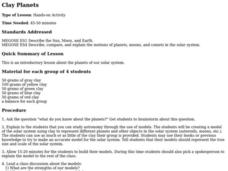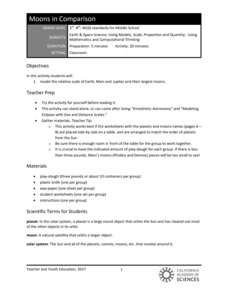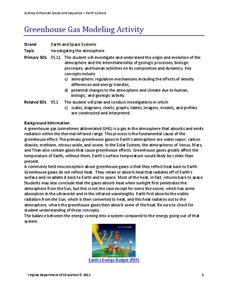NASA
The Science of the Sun
There's more to that glowing ball of light in sky than most children realize. From the overall structure of the solar system, to the changing of the seasons, these hands-on lessons open the eyes of young scientists to the important role...
Curated OER
THAT'S WHY THEY CALL IT SPACE
Ninth graders set up a scale model of the solar system using the same scale for distance and diameter. They calculate scale distances and sizes for modeling the solar system and relate actual distances to difficulties in discovering and...
Curated OER
Lab Activity: Model of the Planets
This worksheet leads the class through the calculations needed to construct circles to represent the planets of our Solar System. The actual values are provided, as are suggested calculations to create the scale diameters. The ten...
California Academy of Science
Modeling Eclipses with Size and Distance Scales
Size within the solar system is a difficult thing for pupils to imagine. Using everyday objects, they build models to show the scale between the sun, moon, and Earth. They situate their props in proportional distances between the objects...
Curated OER
Earth Moon Scaling
A wonderful lesson incorporating math and physics skills along with specific details about the planetary bodies. The cross-curricular approach makes for a valid activity to challenge multiple ages and abilities. Your class could work in...
Curated OER
History of Our Solar System Time Line
Ninth graders explore the concept of ratios. In this ratio lesson, 9th graders construct a to scale time line that starts at the beginning of time. Students determine the correct placement of big events in time such as when the dinosaurs...
Curated OER
The Solar System Walk
A unique lesson on the solar system, and some of the mathematics associated with it, is here for your high schoolers. Pupils are put into groups of four, and each group is assigned one of the planets from our solar system. They must...
Curated OER
Scale Model of the Solar System
Students explore the size of the planets. In this science lesson, students create a scale model of the solar system. Students determine a scaling factor and calculate the size of their planets. Students create a scale drawing of the...
Curated OER
Bringing the Solar System Down to Earth
Pupils develop a scaled down model of the solar system. In small groups, they calculate the scaled-down diameters of the planets and the sun, the scaled-down distance of the planets from the sun, complete two charts, and create a model...
Journey Through the Universe
Voyage of Discovery
Did you know that Pluto is smaller than the United States of America? It is difficult to conceptualize the size of planets and the distance between them, and the lesson plan addresses those exact issues. After a discussion, pupils create...
Curated OER
A Journey Through Our Solar System
Students investigate the concept of the solar system in our universe by constructing a model that is made to a measurable scale. Once the model is constructed it should be placed in a wide open space for observation and demonstration...
University of Colorado
Looking Inside Planets
Researchers use scientific data to understand what is inside each of the planets. The first in a series of six, this lesson builds off of that concept by having pupils use a data table to create their own scale models of the interiors of...
Curated OER
Scale Model of Our Nearest Stars
Sixth graders calculate a light day, light hour, and light minute from the standard of a light year. After establishing the distances, a one meter scale is created to demonstrate the distance between the sun and the planets of our solar...
Curated OER
The Toilet Paper Solar System
Students classify the planets in the solar system, study planetary objects, and measure the relative distance between planets. In this solar system lesson, students use toilet paper to complete a scale model of the distance between the...
Curated OER
Solar System Bead Distance Activity
Students create a scaled solar system model using colorful beads. In this space science instructional activity, students convert AU units into metric measurements. They arrange the planets according to their distances from the sun.
Curated OER
Our Solar System and Seasons
Sixth graders investigate the relative diameters of planets and distances between them and the cause for seasons on Earth using the 5-E Learning Model. They appreciate the size and distances involved with objects in the real universe....
Curated OER
The Solar System
Students describe the different bodies that make up our solar system, explain the place of our solar system within the Milky Way Galaxy and the universe, explain day and night and the Earth's movement, and describe the relationship...
Alabama Learning Exchange
Scaling Down the Solar System
Learners work collaboratively to gain a better understanding of the vastness of space by scaling down the solar system. They measure by inches, gain an understanding of space, and model the distances of the planets from the sun.
Curated OER
Scale Model of the Solar System
Students work in groups of 4-6 for the experiment/activity part of this exercise. Students know that earth is the third planet from the sun in a system that includes the moon, the sun, eight other planets and their moons, and smaller...
Curated OER
Clay Planets
Have your class learn about the solar system using this hands on technique. Learners review what they know about the planets, and create a clay model of the solar system. There are a list of resource links to make this instructional...
California Academy of Science
Moons in Comparison
Just how big is Earth's moon? With a hands-on simulation, scholars use Play-Doh to model the sizes of the planets Earth, Mars, Jupiter, and their moons. They make predictions as a class, work together to make their models, and discuss...
Virginia Department of Education
Greenhouse Gas Modeling Activity
Why are greenhouse gases called greenhouse gases? Young Earth scientists learn about greenhouse gases though experimentation in the second installment of a 3-part series. They use lamps to model radiant energy as well as warming through...
Curated OER
The Battle for Ultimate Power
Learners gain an understanding of how the powers of 10 and scientific notation can be used to represent the scale of things in the universe. They relate the number of stars in the universe to the number of grains of sand on Earth's beaches.
Laboratory for Atmospheric and Space Physics
Planetary Distances on the Playground
There's no need to stay inside; get out of the classroom and create a scaled map of the solar system on your playground field! In collaborative groups, scholars identify the distance between the sun and other planets, place planet...








